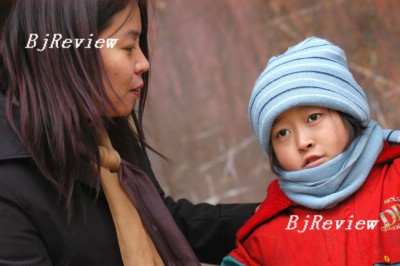
Chinese American filmmaker Ruby Yang described to China's Xinhua News Agency the making of the film The Blood of Yingzhou District--a film about Chinese orphans of AIDS victims--as "a very emotional journey" after she and Thomas Lennon won an Oscar for best documentary short film on February 25. But she believes there's something more horrible than AIDS in the country. That is the indifference of the human heart which breeds discrimination against children who are orphaned by the epidemic.
Determined to change the Chinese mainland's perception of the next AIDS generation, Yang ventured into the epidemic zone with her camera crew and tried to remove the shame imposed on the victimized children.
The result was Oscar-nominated documentary The Blood of Yingzhou District, which chronicles the lives of the Wang sisters, HIV-positive teenager Ren Nannan, and toddler Gao Jun over the course of more than a year, as they brave through many personal challenges.
Its riveting images have haunted viewers in China and abroad and helped dispel the misinformation which perpetuates the stigma against children in AIDS households.
Even though they are healthy, the Wangs are crippled by economic burden when their parents died of AIDS, leaving three daughters to face discrimination at school.
Meanwhile, Gao's uncle and relatives shun any connection with him and leave the toddler to his mentally disabled grandmother who lives in a dilapidated hut next door. The kid is forced to lead a nomadic life seeking shelter in homes of various HIV-positive couples. Finally, AIDS-infected Ren is compelled to silence, fearing that her sister's new husband would seek divorce if he finds out the family shame.
The idea to film the abandoned AIDS orphans in China came to mind when Yang worked as the series editor for Bill Moyers' Becoming American: The Chinese Experience in 2003. "Stories of China's AIDS orphans were headline news then and I really wanted to address the problem publicly," recalled Yang.
She then approached fellow film producer and director Thomas Lennon (The Battle Over Citizen Kane) to collaborate on the project. "Tom said that showing the AIDS documentary here doesn't do anything. It should be aired in China, where it's a matter of life and death."
It took the pair two years to raise the necessary funds, and they founded the China AIDS Media Project in 2004 to direct public service announcement (PSA) and produce documentaries to increase AIDS prevention awareness in China.
Their first PSA, which stars basketball stars Magic Johnson and Yao Ming, has reached millions of Chinese viewers. The rare celebrity endorsements in China helped them gain the trust of the Ministry of Health and won them assistance from the state-owned news mammoth China Central Television.
Contrary to the conception that the Chinese authorities are bureaucratic and opaque about the transmission of public information, Yang said censorship is not a concern at all, "We encountered incredibly little disturbance from the government, and no resistance from local stations."
On the other hand, HIV-positive sex workers and homosexuals are touchy subjects to fathom. "The Ministry of Health talks about high risk groups all the time, but the TV programs are not allowed to openly talk about their lifestyles," she explained.
| 